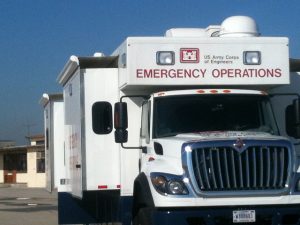 California Vehicle Code 21806 (A)(1) states that all vehicles must yield to emergency vehicles. In order to do so, drivers must pull over to the right-hand side or curb, to allow approaching emergency vehicles passage. Police officers often follow closely behind emergency vehicles to stop and ticket any drivers who fail to yield the right-of-way. Failing to yield the right-of-way could mean multiple things, including not letting the emergency vehicle safely pass, moving in front of an emergency vehicle, or not coming to a complete stop after moving.
California Vehicle Code 21806 (A)(1) states that all vehicles must yield to emergency vehicles. In order to do so, drivers must pull over to the right-hand side or curb, to allow approaching emergency vehicles passage. Police officers often follow closely behind emergency vehicles to stop and ticket any drivers who fail to yield the right-of-way. Failing to yield the right-of-way could mean multiple things, including not letting the emergency vehicle safely pass, moving in front of an emergency vehicle, or not coming to a complete stop after moving.
Receiving a Ticket Under VC 21806 (A)(1)
Receiving a ticket under VC 21806 (A)(1) is a 1 point violation, meaning it could potentially add one point to your DMV record. It also comes with a $490 fine.
- Points have negative effects and should be avoided at all costs.
- The point will stay for three years, visible to any future record searches, such as when being stopped by the police again. In addition to that, points cause vehicle insurance rates to increase.
- Over the period of three years, one point can cost $750 or more in insurance costs alone. Add that to the amount paid for the fine, and that single ticket could cost $1200 or more.
- The court may also require the driver to complete a course in Driver’s Education.
Come to Court Prepared With Evidence
The police officer that wrote the ticket must appear in court to give testimony and prove his or her case. The driver is also given the ability to defend his or her case, and it is important to come to court prepared with evidence.
- It is a good idea to revisit the exact spot the vehicle was pulled over to take pictures of the area because sometimes, there are circumstances in the surroundings that hindered the driver’s ability to properly yield the right of way to emergency vehicles.
- Helpful pictures are the ones that will give a good visual representation of the events on that day, such as any traffic signs, traffic lights, or anything else that will help to prove the driver’s side of the case. For instance, if moving the vehicle would have actually hindered the emergency vehicle, providing pictures of why that is the truth will help bolster the case for the defendant.
- The pictures will be looked at by the judge, who will then have a more clear image of what really happened and what the circumstances were.
Written Explanation of the Circumstances
Another good thing to have prepared is a written explanation of the circumstances. It should be written down as soon as possible, while the memories are still fresh.
- Details are often forgotten over time, and those details may be what is needed to win the case.
- Witnesses who can and are willing to testify in court will also be very helpful, so writing down their information at the scene is also strongly encouraged.
- Some drivers choose to consult with an attorney to attempt to get the ticket dismissed altogether, and avoid any negative side effects.
In order to win his or her case, the police officer that wrote the ticket must appear in court to give testimony, and it can be difficult for them to remember all of the details necessary to land that conviction: the direction the driver was travelling, the direction the emergency vehicle was travelling, where the vehicle was pulled over, any nearby or otherwise important intersections, and even surrounding streets. It is advisable to consult with an Law Firm because they are knowledgeable in these cases, and can easily win them.
As a general rule, any time any type of emergency vehicle is seen on the road with sirens and lights on, move out of their way. This will allow everyone to continue travelling safely, and allowing emergencies to safely take precedence.
[Image:https://www.flickr.com/photos/usacehq/6511655561/]
Scott Desind
Latest posts by Scott Desind (see all)
- How to Request the County Seat and Fight Your California Traffic Ticket - May 21, 2023
- Don’t Even Touch That Cell Phone - July 13, 2022
- Innocent Until Proven Guilty - March 2, 2020

